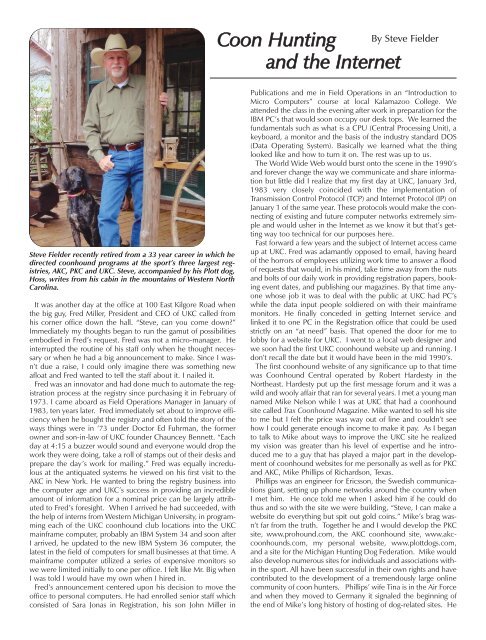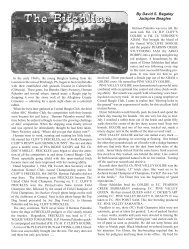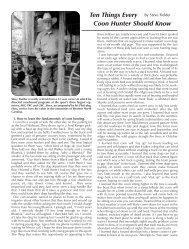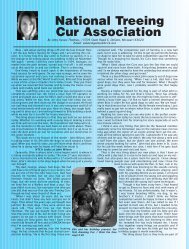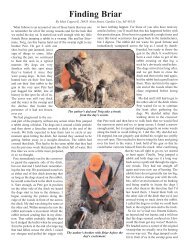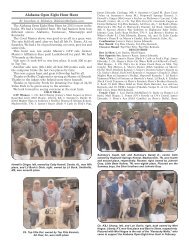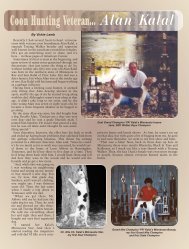Steve Fielder - Huntinghoundsmen.com
Steve Fielder - Huntinghoundsmen.com
Steve Fielder - Huntinghoundsmen.com
Create successful ePaper yourself
Turn your PDF publications into a flip-book with our unique Google optimized e-Paper software.
Coon Huntingand the InternetBy <strong>Steve</strong> <strong>Fielder</strong><strong>Steve</strong> <strong>Fielder</strong> recently retired from a 33 year career in which hedirected coonhound programs at the sport’s three largest registries,AKC, PKC and UKC. <strong>Steve</strong>, ac<strong>com</strong>panied by his Plott dog,Hoss, writes from his cabin in the mountains of Western NorthCarolina.It was another day at the office at 100 East Kilgore Road whenthe big guy, Fred Miller, President and CEO of UKC called fromhis corner office down the hall. “<strong>Steve</strong>, can you <strong>com</strong>e down?”Immediately my thoughts began to run the gamut of possibilitiesembodied in Fred’s request. Fred was not a micro-manager. Heinterrupted the routine of his staff only when he thought necessaryor when he had a big announcement to make. Since I wasn’tdue a raise, I could only imagine there was something newafloat and Fred wanted to tell the staff about it. I nailed it.Fred was an innovator and had done much to automate the registrationprocess at the registry since purchasing it in February of1973. I came aboard as Field Operations Manager in January of1983, ten years later. Fred immediately set about to improve efficiencywhen he bought the registry and often told the story of theways things were in ’73 under Doctor Ed Fuhrman, the formerowner and son-in-law of UKC founder Chauncey Bennett. “Eachday at 4:15 a buzzer would sound and everyone would drop thework they were doing, take a roll of stamps out of their desks andprepare the day’s work for mailing.” Fred was equally incredulousat the antiquated systems he viewed on his first visit to theAKC in New York. He wanted to bring the registry business intothe <strong>com</strong>puter age and UKC’s success in providing an incredibleamount of information for a nominal price can be largely attributedto Fred’s foresight. When I arrived he had succeeded, withthe help of interns from Western Michigan University, in programmingeach of the UKC coonhound club locations into the UKCmainframe <strong>com</strong>puter, probably an IBM System 34 and soon afterI arrived, he updated to the new IBM System 36 <strong>com</strong>puter, thelatest in the field of <strong>com</strong>puters for small businesses at that time. Amainframe <strong>com</strong>puter utilized a series of expensive monitors sowe were limited initially to one per office. I felt like Mr. Big whenI was told I would have my own when I hired in.Fred’s announcement centered upon his decision to move theoffice to personal <strong>com</strong>puters. He had enrolled senior staff whichconsisted of Sara Jonas in Registration, his son John Miller inPublications and me in Field Operations in an “Introduction toMicro Computers” course at local Kalamazoo College. Weattended the class in the evening after work in preparation for theIBM PC’s that would soon occupy our desk tops. We learned thefundamentals such as what is a CPU (Central Processing Unit), akeyboard, a monitor and the basis of the industry standard DOS(Data Operating System). Basically we learned what the thinglooked like and how to turn it on. The rest was up to us.The World Wide Web would burst onto the scene in the 1990’sand forever change the way we <strong>com</strong>municate and share informationbut little did I realize that my first day at UKC, January 3rd,1983 very closely coincided with the implementation ofTransmission Control Protocol (TCP) and Internet Protocol (IP) onJanuary 1 of the same year. These protocols would make the connectingof existing and future <strong>com</strong>puter networks extremely simpleand would usher in the Internet as we know it but that’s gettingway too technical for our purposes here.Fast forward a few years and the subject of Internet access cameup at UKC. Fred was adamantly opposed to email, having heardof the horrors of employees utilizing work time to answer a floodof requests that would, in his mind, take time away from the nutsand bolts of our daily work in providing registration papers, bookingevent dates, and publishing our magazines. By that time anyonewhose job it was to deal with the public at UKC had PC’swhile the data input people soldiered on with their mainframemonitors. He finally conceded in getting Internet service andlinked it to one PC in the Registration office that could be usedstrictly on an “at need” basis. That opened the door for me tolobby for a website for UKC. I went to a local web designer andwe soon had the first UKC coonhound website up and running. Idon’t recall the date but it would have been in the mid 1990’s.The first coonhound website of any significance up to that timewas Coonhound Central operated by Robert Hardesty in theNortheast. Hardesty put up the first message forum and it was awild and wooly affair that ran for several years. I met a young mannamed Mike Nelson while I was at UKC that had a coonhoundsite called Trax Coonhound Magazine. Mike wanted to sell his siteto me but I felt the price was way out of line and couldn’t seehow I could generate enough in<strong>com</strong>e to make it pay. As I beganto talk to Mike about ways to improve the UKC site he realizedmy vision was greater than his level of expertise and he introducedme to a guy that has played a major part in the developmentof coonhound websites for me personally as well as for PKCand AKC, Mike Phillips of Richardson, Texas.Phillips was an engineer for Ericsson, the Swedish <strong>com</strong>municationsgiant, setting up phone networks around the country whenI met him. He once told me when I asked him if he could dothus and so with the site we were building, “<strong>Steve</strong>, I can make awebsite do everything but spit out gold coins.” Mike’s brag wasn’tfar from the truth. Together he and I would develop the PKCsite, www.prohound.<strong>com</strong>, the AKC coonhound site, www.akccoonhounds.<strong>com</strong>,my personal website, www.plottdogs.<strong>com</strong>,and a site for the Michigan Hunting Dog Federation. Mike wouldalso develop numerous sites for individuals and associations withinthe sport. All have been successful in their own rights and havecontributed to the development of a tremendously large online<strong>com</strong>munity of coon hunters. Phillips’ wife Tina is in the Air Forceand when they moved to Germany it signaled the beginning ofthe end of Mike’s long history of hosting of dog-related sites. He
cess vendors are experiencing today despite the economy and anoverall decline in the number of individuals actually engaged inthe sport may be, in part, proof of this theory. I can see imagesof cyber hunters out there, all geared-up in their boots, lights,GPS trackers, electronic trainers and squallers, and saturated inmosquito repellant as they surf the coonhound message boards.Ridiculous perhaps but the idea is the same. If hunters are spendingtraining time on the <strong>com</strong>puter, the sport, in terms of producingbetter hounds, has to suffer overall.On the other side of the coin, the Internet may create interestin the sport in ways we never thought possible. Young people,surfing the web may be intrigued by the exciting aspects of nitehunting, may be influenced to join peers of their age group andmay seek out clubs in their areas in which to participate allbecause they were introduced to the sport online. Older huntersmay find in the Internet the opportunity to stay in tune with thesport long after their bodies have signaled it’s time to quit. There’sno doubt the information super highway delivers information onthe whereabouts of good hounds, and those not so good, at warpspeed and enables a prospective buyer to shop several houndsbefore deciding to make the long drive to hunt with the dog or tobreed a female. The convenience aspects of Internet coon huntingare many and likewise are the pitfalls. Prospective buyersmay buy into online hype rather than actually going out andmashing mud behind the hound before breeding or buying andtherein lies the danger. Of course that same danger lies in printedads in coonhound publications. Hunt before you buy is goodadvice no matter how one finds a hound of interest.Will Facebook replace the Message Boards?Enhanced <strong>com</strong>munication within the sport has been the greatestbenefit gained through the Internet. And as important as thecoonhound message boards have be<strong>com</strong>e, new vehicles are nowavailable that enable coon hunters to <strong>com</strong>municate at levelsnever before possible. Entrepreneur Sean Parker, whose networth reached $2.1 billion in the third quarter of 2011, was thefounding President of Facebook, the social media craze that isalready changing the way many coon hunters and coonhoundenthusiasts <strong>com</strong>municate.The advantages of Facebook and the less popular but effectiveTwitter, over the message boards are many. Unlike the messageboards, users may “choose” those with which they wish to <strong>com</strong>municateto the exclusion of anyone else. Users send “friend”requests to other users and if accepted, they reap the opportunityto enter the friend’s online <strong>com</strong>munity, noting not only thefriend’s posted thoughts but also viewing personal informationthe friend has chosen to post on their “wall,” another name forwhat amounts to a personal web page. And coon hunters areusing Facebook in ever-increasing numbers. Currently I haveresponded to more than 700 friend requests on my Facebookpage, mainly consisting of coon and big game hunters. When arequest is received, the number of mutual friends shared withthat individual is posted, giving me a pretty good idea of the typeof person that originated the request. If I make a bad choice, evidencedby the type of posts that appear on my wall from the individual,once they be<strong>com</strong>e my friend, I can “un-friend” that individualand I don’t have to view his or posts any more. Moreimportantly, I don’t have to wait for a message board monitor todo the job for me. Unlike the message forums which consist of apotpourri of posts of every description, and in many cases fromunknowns, Facebook allows me to <strong>com</strong>municate with those Ihave chosen and no more.The greatest benefit of Facebook over message boards in myview is the ability to <strong>com</strong>municate with those from whom I wishto hear, from all walks of life, not just the hunting <strong>com</strong>munity, andto do so with the smallest amount of effort in the shortest amountof time.Twitter is another social media vehicle that permits me theopportunity to follow the daily ramblings of individuals of mychoosing. There’s a very stingy limit of characters one may <strong>com</strong>posein a “Tweet” and I use it mainly to keep up with sports figuresand politicians that I wish to “follow.” It’s a simple “what’son my mind” kind of thing that isn’t nearly as involved asFacebook and to date, coon hunters haven’t embraced it. I amfollowing 10 personalities on Twitter, none of them coon huntersand I have three that are following me. Contrast that with the 700Facebook friends I have and you get the picture.Facebook’s “Ego Wall” EffectWhereas it has generally been considered poor taste to bragabout the ac<strong>com</strong>plishments of one’s dogs in printed newscolumns or in online message forums, there’s a different environmenton Facebook in regard to boasting of one’s ac<strong>com</strong>plishmentsin dog shows and to a lesser but increasing degree, in NiteHunt <strong>com</strong>petition. Users are routinely posting their “wins” fortheir friends to see, much as one would use the phone to call aclose friend or perhaps the owner of a dog one is handling and togive the results of the night’s hunt or the day’s activities at the dogshow. Apparently, displaying one’s “ego wall” of achievements onFacebook is as acceptable as having a guest to your home tour ofyour trophy room.CONCLUSIONThere’s no doubt the Internet has enhanced the sport of coonhunting from a <strong>com</strong>munications standpoint and it can be arguedthat it has hindered the performance of our dogs and the qualityof the outdoors experience for many of us who have fallen for thelure of the monitor over the call of the wild. But, for many othersof us, especiallyold school guys likeme, there’s no substitutefor the friendlyfeel of a goodbook or favoritemagazine in hand atthe close of a long orweary day. I’veespecially enjoyedreading my coonhoundmagazinessince my retirementto the mountains.And, although Ienjoy the economyand convenience ofmy Amazon Kindleelectronic reader, IEven an e-book like the Kindle “reads”better when bound with a traditionalbook cover.had to purchase a book cover for it so I could have the <strong>com</strong>fortand security I feel with a good book in hand when I read. No<strong>com</strong>puter screen can take me to faraway places, along sweet-runningstreams and bring the call of the hounds to heart like turningthe pages of the real thing. Even when I sat down to proofread this article before sending it along to the publisher, I had toprint it out and hold it in my hand.The Internet will impact our sport, no matter whether we acceptit or not. It will be up to you and me to keep things in perspective,to remember that there’s no substitute for hunting ourhounds if we wish them to succeed, and that words spoken, ortyped as the case may be, have an effect on those that hear orread them. It’s our job to ensure that they result in somethinggood. In closing, pardon me as I paraphrase Psalm 19:14:Let the words (that I type), and the meditation of my heart, beacceptable in thy sight, O LORD, my strength, and my redeemer.


